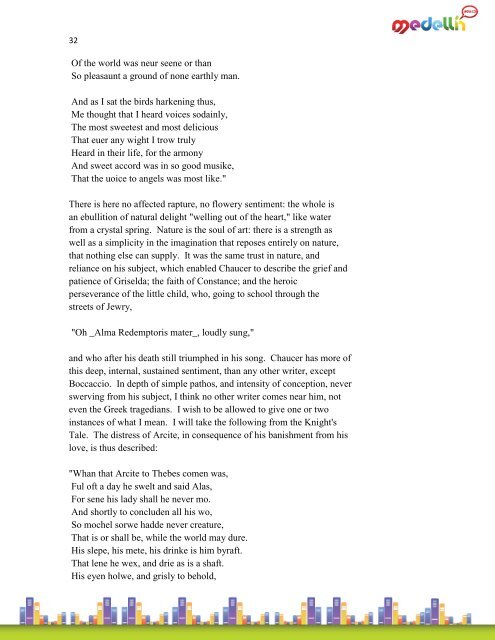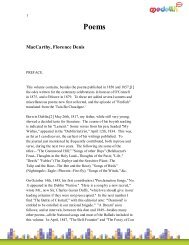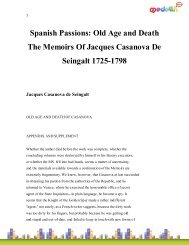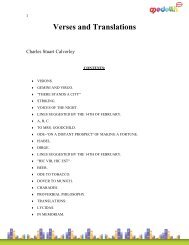Lectures On The English Poets William Hazlitt
Lectures On The English Poets William Hazlitt
Lectures On The English Poets William Hazlitt
You also want an ePaper? Increase the reach of your titles
YUMPU automatically turns print PDFs into web optimized ePapers that Google loves.
32<br />
Of the world was neur seene or than<br />
So pleasaunt a ground of none earthly man.<br />
And as I sat the birds harkening thus,<br />
Me thought that I heard voices sodainly,<br />
<strong>The</strong> most sweetest and most delicious<br />
That euer any wight I trow truly<br />
Heard in their life, for the armony<br />
And sweet accord was in so good musike,<br />
That the uoice to angels was most like."<br />
<strong>The</strong>re is here no affected rapture, no flowery sentiment: the whole is<br />
an ebullition of natural delight "welling out of the heart," like water<br />
from a crystal spring. Nature is the soul of art: there is a strength as<br />
well as a simplicity in the imagination that reposes entirely on nature,<br />
that nothing else can supply. It was the same trust in nature, and<br />
reliance on his subject, which enabled Chaucer to describe the grief and<br />
patience of Griselda; the faith of Constance; and the heroic<br />
perseverance of the little child, who, going to school through the<br />
streets of Jewry,<br />
"Oh _Alma Redemptoris mater_, loudly sung,"<br />
and who after his death still triumphed in his song. Chaucer has more of<br />
this deep, internal, sustained sentiment, than any other writer, except<br />
Boccaccio. In depth of simple pathos, and intensity of conception, never<br />
swerving from his subject, I think no other writer comes near him, not<br />
even the Greek tragedians. I wish to be allowed to give one or two<br />
instances of what I mean. I will take the following from the Knight's<br />
Tale. <strong>The</strong> distress of Arcite, in consequence of his banishment from his<br />
love, is thus described:<br />
"Whan that Arcite to <strong>The</strong>bes comen was,<br />
Ful oft a day he swelt and said Alas,<br />
For sene his lady shall he never mo.<br />
And shortly to concluden all his wo,<br />
So mochel sorwe hadde never creature,<br />
That is or shall be, while the world may dure.<br />
His slepe, his mete, his drinke is him byraft.<br />
That lene he wex, and drie as is a shaft.<br />
His eyen holwe, and grisly to behold,

















